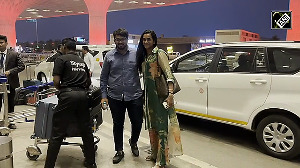US Senate may not pass the new Bill, which sought to prevent Indian companies from posting their employees on clients' location in that country, according to Congressman Jay Inslee.
"The Bill has only been introduced, but I doubt whether it will become a law at all, as it has to pass through a number of stages before getting a final clearance," Inslee told reporters on Thursday on the sidelines of a summit organised by the Confederation of Indian Industry in Mumbai.
The new visa Bill was introduced in the US House of Representatives on May 19, which seeks to prevent a non-US citizen (an intra-company transferee) for working with a company, other than his employer. This also means that an employee cannot be deployed to the employer's client sites.
"We cannot engage in protectionism in the US and at the same time expect to sell Microsoft and Boeing products in India. I don't believe the US should have a visa policy that slows down economic growth," Inslee said.
Talking on the stringent measures taken before issuing an L1 visa, the Congressman said this was more due to security concerns and doesn't reflect any fear doing rounds in the US.
"The September 9/11 incidents had prompted the US government to exercise caution in granting visas. However, no major legislative changes have been recommended", he said.
"The stringent measures, including new visa interview for L1 visas, are to ascertain the legitimacy of employment relation with the employee and the employer," he added.
However, talking on the H-1 visas, Inslee said that there would not be any change in the existing policies and added, "there is no reason for changing the existing structure".
Allaying fears on the recent bills, the Congressman said outsourcing bills were limited to just four states in the US and none of the bills had become a law. "India and US have a lot in common and we have to grow together," he said.
Meanwhile, addressing a seminar on 'Globalisation and Business Process Outsourcing: Win-Win for India and United States' organised by the CII, Inslee said that the government should not enforce technology, instead must allow the market to choose it.
"The Indian government should be technology neutral and allow the market to decide the kind of software that should be used in India like it is in the US and UK," he said.
The Congressman, however, said that protection of intellectual property was the need of the hour and added that around 65 per cent of all software were a victim of intellectual property theft.
CII Maharashtra chairman Sudhir M Tehran admitted that a few Indian companies had misused L1 visas, and urged the US government to weigh the pros and cons before passing the bill.





 © 2025 Rediff.com -
© 2025 Rediff.com -